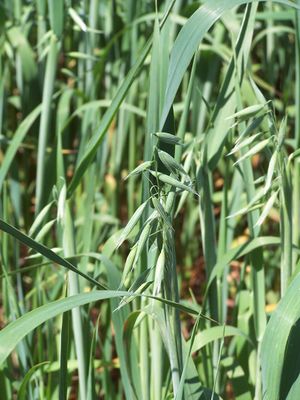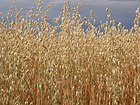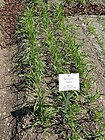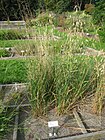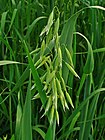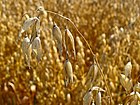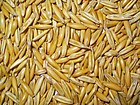Note: This is a project under development. The articles on this wiki are just being initiated and broadly incomplete. You can Help creating new pages.
Avena sativa - Oat
The oat (Avena sativa), sometimes called the common oat, is a species of cereal grain grown for its seed, which is known by the same name (usually in the plural, unlike other cereals and pseudocereals). While oats are suitable for human consumption as oatmeal and rolled oats, one of the most common uses is as livestock feed.
Contents
- 1 Uses
- 2 Parts Used
- 3 Chemical Composition
- 4 Common names
- 5 Properties
- 6 Habit
- 7 Identification
- 8 List of Ayurvedic medicine in which the herb is used
- 9 Where to get the saplings
- 10 Mode of Propagation
- 11 How to plant/cultivate
- 12 Commonly seen growing in areas
- 13 Photo Gallery
- 14 References
- 15 External Links
Uses
lower blood pressure, bad cholesterol, insomnia, stress, anxiety, blood sugar, aphrodisiac, rashes, sunburn.
Parts Used
Seeds, dried stem, leaf.
Chemical Composition
Per 100 g, the mature seed is reported to contain 374 calories, 11.0 g H20, 13.1 g protein, 6.1 g fat, 67.4 g total carbohydrate, 5.8 g fiber, 2.4 g ash, 59 mg Ca, 425 mg P, 4.6 mg Fe, 10 mg Na, 0.35 mg thiamine, 0.09 mg riboflavin, and 2.2 mg niacin. Generically, oat grains, with 78.7–95.2% DM (mean of 1650 cases = 89.1), contain on a zero moisture basis[1]
Common names
| Language | Common name |
|---|---|
| Kannada | |
| Hindi | |
| Malayalam | |
| Tamil | |
| Telugu | |
| Marathi | NA |
| Gujarathi | NA |
| Punjabi | NA |
| Kashmiri | NA |
| Sanskrit | |
| English | Common Oat |
Properties
Reference: Dravya - Substance, Rasa - Taste, Guna - Qualities, Veerya - Potency, Vipaka - Post-digesion effect, Karma - Pharmacological activity, Prabhava - Therepeutics.
Dravya
Rasa
Guna
Veerya
Vipaka
Karma
Prabhava
Habit
Identification
Leaf
| Kind | Shape | Feature |
|---|---|---|
| Simple | cauline | Ligule an eciliate membrane; 3-6 mm long. Leaf-blades 14-40 cm long 5-15 mm wide and Leaf-blade surface scaberulous |
Flower
| Type | Size | Color and composition | Stamen | More information |
|---|---|---|---|---|
| Unisexual | 2-4cm long | Yellow | 5-20 | Ovary pubescent all over and Flowers Season is June - August |
Fruit
| Type | Size | Mass | Appearance | Seeds | More information |
|---|---|---|---|---|---|
| Caryopsis | Caryopsis with adherent pericarp; hairy all over. Hilum linear | hairy all over | few seeds | {{{6}}} |
Other features
List of Ayurvedic medicine in which the herb is used
- Vishatinduka Taila as root juice extract
Where to get the saplings
Mode of Propagation
How to plant/cultivate
Oats are an easily grown crop that succeeds in any moderately fertile soil in full sun[3]
Commonly seen growing in areas
Cultivated Beds, Dry wasteland, cultivated ground and meadows.
Photo Gallery
References
External Links
- Pages that are stubs
- Ayurvedic Herbs known to be helpful to treat lower blood pressure
- Ayurvedic Herbs known to be helpful to treat bad cholesterol
- Ayurvedic Herbs known to be helpful to treat insomnia
- Ayurvedic Herbs known to be helpful to treat stress
- Ayurvedic Herbs known to be helpful to treat anxiety
- Ayurvedic Herbs known to be helpful to treat blood sugar
- Ayurvedic Herbs known to be helpful to treat aphrodisiac
- Ayurvedic Herbs known to be helpful to treat rashes
- Ayurvedic Herbs known to be helpful to treat sunburn
- Herbs with Seeds used in medicine
- Herbs with dried stem used in medicine
- Herbs with leaf used in medicine
- Herbs with common name in English
- Habit - Culms erect
- Index of Plants which can be propagated by Seeds
- Herbs that are commonly seen in the region of Cultivated Beds
- Index of Plants which can be propagated by Dry wasteland
- Index of Plants which can be propagated by cultivated ground and meadows
- Herbs
